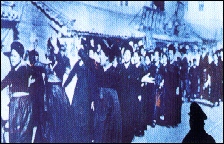KOREA>HISTORY>The Japanese Occupation and Korea's Independence Movement
![]()
7. The Japanese Occupation and Korea's Independence Movement
 Korea underwent drastic changes under Japanese rule. In theory the Koreans,
as subjects of the Japanese emperor, enjoyed the same status as the
Japanese; but in fact the Japanese government treated the Koreans as a
conquered people. Until 1921 they were not allowed to publish their own
newspapers or to organize political or intellectual groups. Japan was mainly
interested in the economic exploitation of Korea. Japanese farmers and
fishermen were encouraged to emigrate to Korea and were given land free or
at low cost. Large quantities of rice were exported to Japan, while Koreans
faced a serious food shortage. As the Japanese prospered on Korean
resources, the Korean standard of life deteriorated drastically. As a
result, hundreds of thousands of Korean farmers abandoned their farms and
moved to Manchuria or Japan, only to find life no easier there.
Korea underwent drastic changes under Japanese rule. In theory the Koreans,
as subjects of the Japanese emperor, enjoyed the same status as the
Japanese; but in fact the Japanese government treated the Koreans as a
conquered people. Until 1921 they were not allowed to publish their own
newspapers or to organize political or intellectual groups. Japan was mainly
interested in the economic exploitation of Korea. Japanese farmers and
fishermen were encouraged to emigrate to Korea and were given land free or
at low cost. Large quantities of rice were exported to Japan, while Koreans
faced a serious food shortage. As the Japanese prospered on Korean
resources, the Korean standard of life deteriorated drastically. As a
result, hundreds of thousands of Korean farmers abandoned their farms and
moved to Manchuria or Japan, only to find life no easier there. Colonial rule stimulated the growth of nationalism among Koreans. Korean intellectuals were infuriated by Japan's official assimilation policy. They asserted their differences and struggled to distance themselves culturally from their colonial masters. In 1919, Koreans staged nationwide protests at the cost of thousands of lives. This independence movement failed to depose the Japanese, but gave Koreans strong bonds of national identity and patriotism, and led to the establishment of the Provisional Government in Shanghai and to an organized armed struggle against the Japanese colonialists in Manchuria. |
